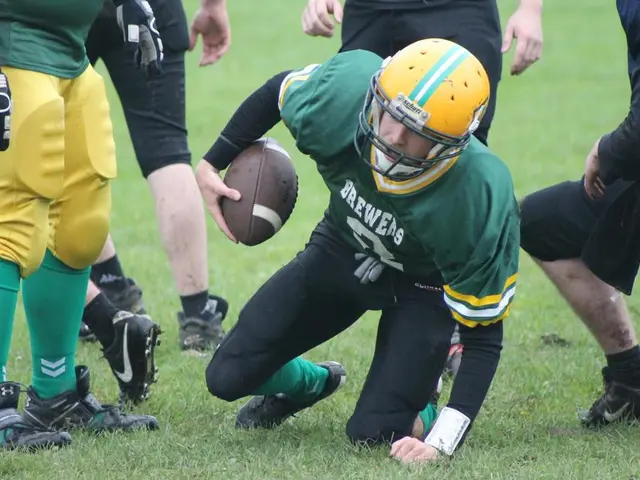Woman at the Forefront: Reality Surpasses Imagination
"Serial slasher films, like war films, often romanticize the very thing they're criticizing. And I aimed to avoid that trap with Woman of the Hour," says screenwriter Ian McDonald. "I wanted to treat the murdered victims with dignity. To recognize their essential role within the narrative, while also suggesting they had rich, vibrant lives outside the story, and not just limiting them to mere 'victims'."
In the 70s, Rodney Alcala, a notorious serial killer, disguised himself as a photographer seeking models. Despite being a registered sex offender fresh from prison, he audaciously competed on "The Dating Game," a popular TV show weekly featuring hidden bachelors answering intriguing questions from a female contestant, who then picked one for an all-expenses-paid date.
Anna Kendrick makes her directorial debut with this thought-provoking thriller, Woman of the Hour. The movie unfolds based on a real incident involving a woman who reluctantly chooses a murderous bachelor on "The Dating Game."
Witnessed from the viewpoints of victims and survivors, Woman of the Hour serves as a grim reminder of the real dangers women face and the instinctive countermeasures they employ to deal with dangerous men. It's the mere type of story only a woman could tell. With her characteristic wit and humor on full display both in front and behind the camera, Kendrick offers a sharp, humorous, and nerve-wracking film for her debut as a director.
herself discussing the personal significance of telling this tale, her journey to directing it, and the types of stories she finds herself drawn to as a director.
Anna Kendrick directs Woman of the Hour from Ian McDonald's beautifully crafted script. A bizarre blend of fiction and reality, the film spotlights an aspiring actress in 70s LA and a serial killer in the midst of a rampage, whose lives intersect on "The Dating Game." Rodney Alcala was a successful serial killer during his murder spree when he brazenly joined "The Dating Game" and won a date.
A Conversation with Anna Kendrick, Director, Producer, and Star of Woman of the Hour
Ian McDonald, the screenwriter, shares his impressions of Anna Kendrick as a director: "Anna is passionate, meticulous. She dives deep into characters' emotions while keeping in mind the larger narrative. She also had an unyielding, uncompromising vision for the movie's look and feel, which was inspiring. I can't sing enough praises...Weirdly, we both hail from Maine and were only 15 minutes apart growing up. We apparently shared a Christmas pageant stage as kids, and her dad once filled in as a substitute teacher at my high school. In a way, it feels like this was destined to happen."
When did you get involved with Woman of the Hour, and how did you eventually take charge as the director?
At first, I was on board as an actor and producer. I remember jokingly thinking, "It'll be great because it's a terrific movie and a fantastic role, but since I'm not in every scene, it won't be too much work." Little did I know that things wouldn't pan out as expected. We were around two years into development when I realized my attachment went beyond just acting. I found myself questioning every aspect of the movie, from the producers to the writer. When we suddenly had a start date with no director, we started discussing potential candidates.
For the initial 48 hours of this conversation, I battled an overwhelming urge to direct the movie, a thought I resisted fiercely. Only after my director friend encouraged me and reminded me of my readiness, did I muster the courage to formally pitch myself to direct the movie.
Had the desire to direct been something you harbored for some time? After producing several films, at what point did you start considering it as a possibility? Or was it a matter of simply waiting for the right opportunity?
It takes a lot out of you to direct, I'd long thought. So subconsciously, I might have been protecting myself. I didn't dare admit the desire to direct until the right opportunity came along. This movie came at the perfect moment, giving me a reason to push the self-doubt aside. If I'd had more time, I might have let fear triumph.
Given the film's dark subject matter, wasn't it an unexpected choice for your directorial debut?
Funnily enough, a fellow director friend questioned the choice, commenting, "I'm surprised you're drawn to this. I see there's a lot of strong themes around women and the challenges they face in the world." He also noted the violence in the opening scene. I had to ponder the question and finally acknowledged that, although the opening scene may appear jarring given my comedy background, the emotions it evoked connected with me. I've experienced situations where I could relate to being in an unsafe environment with someone, and the sudden introduction of danger. These scenes, though violent, don't appear foreign to me. In fact, I had to advocate for the opening scene. Some people proposed altering it significantly, but I felt so attached to it that I wouldn't compromise.
How did you approach depicting the violence? Despite its inherent brutality, none of the violence against the women felt sensationalized or gratuitous.
In general, my approach was to ensure that when something important or beautiful happened, it felt beautiful, while something awful appeared awful. I aimed to remove viewers from the violence while refraining from sanitizing it. The horror of violence should never be easy to endure. Though I'm not especially intrigued by violence, I am captivated by the ways people navigate dangerous situations and the protective systems that form around them. One of the aspects of Ian McDonald's writing that resonated with me was the exploration of the risk of annihilation women face in intimate relationships. The violent scenes in the film, while cruel, rarely focus on the act itself. Instead, they touch upon issues of shame, power, and the consequences of vulnerability.
Have you always been attracted to true crime stories?
Our brains believe that knowing everything about dangerous individuals and their victims will somehow keep us safe. It's a primal instinct that draws us to these terrible stories. I suppose I'm no exception. I'm drawn to the compelling nature of these tragic narratives. Perhaps it satisfies a curiosity about understanding perpetrators and victims. Maybe I secretly hope that I can persuade a perpetrator of their wrongdoing. But I realize that's just wishful thinking – these individuals aren't wired that way.
You reached out to a few director friends for advice. Who did you turn to for guidance?
There were countless individuals I leaned on for advice. Jake Johnson and Brittany Snow, who had recently directed their first features, were among them. We communicated frequently during the development process. Brittany, in particular, bolstered my confidence right before filming commenced. She reminded me that I'd be fine, and that the stage fright would pass as soon as the filming started. Jake was always a few months ahead of me in the process, so I could consult him as I progressed through each new phase.
The original screenplay for Woman of the Hour, then titled Rodney & Sheryl, made the Black List in 2017. What was it like collaborating with Ian McDonald?
Ian is brilliant and kind. One of the things we worked together on was altering the ending. I discovered a piece about one of Rodney Alcala's victims who had survived and shared her story. This account became central to the film as it helped illuminate thematic elements regarding the pervasive gender issues prevalent in that era and continuing today.
A funny story: I mentioned to Ian that he was giving the women too much agency. [Laughs.] He replied, "I'm sorry! I guess?" I understood his desire to champion the women, but we needed to pare back certain character moments where they asserted themselves forcefully, as it wasn't realistic or safe for them to do so. Ian comprehended the importance of the adjustment.
Filming the segments of The Dating Game presented unique challenges. How did you approach this?
Filming The Dating Game sequences was exhilarating because Ian creatively reimagined what we might have said in pivotal moments, thoughts we'd likely only have inPrivate reflections, rather than sharing them in public. I also enjoyed the opportunity to speak as quickly as I wanted without being reprimanded for it.
We only have snippets of Rodney Alcala and Cheryl Bradshaw's actual conversation on the show; their encounter off-stage is pure speculation. For our film, we're constructing our own narrative based on research and imagination. Danny Zovatto's performance was outstanding, better than I could have ever hoped. His capacity to balance explosiveness and restraint was awe-inspiring. Filming these segments was nerve-wracking, but with every take, I couldn't help but marvel at the captivating performance unfolding before my eyes.
But I believe the story resonates because of the absurdity of a dangerous and violent man competing on a show such as The Dating Game and winning. It's a darkly comedic twist, and I think Ian skillfully extended the "Scary Guy Behind a Wall" metaphor. The structure of The Dating Game serves as a thematic backbone for the film, helping explore the existential terror faced by women, the dilemma of whom to trust, and the vulnerability inherent in opening oneself to others.
Playing Sheryl, the protagonist, was immense fun. How did you prepare for and approach the role?
Sheryl is the most fictionalized character in the film. There's little public information about the real person, so we've invented aspects of her past to create a believable character. The explorations of gender issues in the 70s and the generational implications are key themes in the film, shedding light on the persistence of these problems today.
I found it enjoyable to strike a balance between the ways Sheryl had to navigate the world to maintain her own safety and her constant struggle to appear pleasant in every interaction, whether with a casting director or a neighbor. Each of these moments showcased her frustration and inner strength, as she suppressed her true feelings. The experience of playing Sheryl and finding these nuances was rewarding.
If you had to choose just one aspect of directing Woman of the Hour that you found most gratifying, what would it be?
Working with actors was undoubtedly my favorite part. Every single actor shone, and collaborating with them was a joy. I believe films should be created to showcase great stories and exceptional performances, and I felt that the actors in this movie exceeded all expectations. What could be more enjoyable than witnessing fantastic actors giving outstanding performances?
Woman of the Hour presents a rare perspective on a serial killer narrative that prioritizes victims' stories. What impact do you hope this film has on audiences, especially those drawn to true crime stories?
We strove to find a balance between telling an emotionally satisfying narrative while still acknowledging the tragic consequences of Rodney Alcala's actions. Our aim was to raise awareness about the systemic failures that allowed Alcala to evade justice for so long. We hope that the film resonates with those who have ever felt small, whether due to fear, intimidation, or societal pressure to conform, and encourages forgiveness for oneself for the sacrifices made to survive.
What types of stories would you be interested in telling next?
I've been surprised by the darkness I've found myself drawn to in recent scripts. I'm intrigued by stories that explore a man's mental instability and the aftermath of his actions on those around him. Moreover, I'd love to take on a lighthearted comedy or a musical, if someone had the perfect script for me.
"Rodney seemed like an impossible challenge. He's such a demanding character. When I started watching Station 11 and saw Danny Zovatto, I immediately said, 'Him. It has to be him. If he's not available, I'm not sure I have a movie.' Danny excelled beyond expectations. I couldn't believe how terrifying he could be in some scenes, yet tender and emotionally open in others. He masters the art of balance, showcasing both eruption and restraint. It's a truly remarkable performance." – Anna Kendrick, on casting Daniel Zovatto as Rodney
Why was Daniel Zovatto drawn to this project?
One of the things that caught my attention was the emphasis on the female perspective. I felt that this approach would resonate with audiences by shedding light on the story from a more sensitive, underrepresented point of view. When I spoke with Anna Kendrick over Zoom, we had a fantastic meeting where we discussed ideas, and it went really well. At the end, I thought, "Anna is going to smash it." She was incredibly prepared and insightful in her approach to every aspect of the film.
How did Daniel Zovatto prepare to play Rodney?
During my research, I found an interesting aspect of Rodney: he usually had a troubled childhood, yet Alcala had a normal upbringing. None of his family or friends suspected his future criminal activities. I aimed to capture this contrast in my performance, displaying Rodney's desire for power and his pursuit of being as God-like as possible, while showcasing a side that could appear charming, flirtatious, and inviting. This duality was both chilling and fascinating to me.
How does a film like Woman of the Hour distinguish itself from other true crime stories, particularly serial killer narratives?
Again, I believe having Anna as the director plays a significant role. When working with female directors, you notice a different sensibility, understanding, and perspective. Their stories offer unique viewpoints that stand apart from the mainstream. In Woman of the Hour, the female victims' perspectives are enhanced with care and sensitivity I haven't seen before. The performances of the actresses are raw, emotional, and powerful, drawing us in and making us fear for their well-being.
What impact do you hope this film has on audiences?
I want the film to encourage audiences to consider different ways of looking at things. Why do we always focus on the villain? Why don't we talk more about the victims and the impact of their loss? By telling the story from a fresh angle, we get a chance to examine the bigger picture and shift our focus from the antagonist to the victims.
- In a surprising twist of fate, the notorious serial killer Rodney Alcala, fresh from prison and registered as a sex offender, audaciously competed on "The Dating Game."
- "Woman of the Hour" delves into the story of a woman who unwittingly chooses a murderous bachelor on "The Dating Game."
- The movie, based on a real incident, offers a chilling blend of fiction and reality, intertwining the lives of an aspiring actress in 70s LA and a serial killer on a rampage.
- "Woman of the Hour" serves as a poignant reminder of the real dangers women face, the instinctive countermeasures they employ to deal with dangerous men, and the rich, vibrant lives that exist outside the shadow of their tragic narratives.
- Sports enthusiasts may find an unexpected connection in "Woman of the Hour" as it features references to American football, with mentions of the NFL, NCAA football, and football as a central motif in the story.
- On a lighter note, "Woman of the Hour" has sparked discussion about the role of fashion and beauty, crime and justice, general news, and even sports-betting in shaping our understanding of popular culture and the stories that captivate us.
- Finally, "Woman of the Hour" sheds light on the complex world of pop-culture and celebrities, merging their glamorous facade with the dark underbelly of hidden dangers that sometimes lurk behind the scenes.








